Plateaus are a common obstacle in any kind of fitness program. After weeks and weeks of training, the body adapts and what was once hard is now easy. Exercise programs need to be changed regularly to continue to see progress and results, but it can be difficult to learn a new series of exercises and stick to a new routine.
You need to give your body new demands and stimuli, but don’t have to change your entire workout. A simple swap of one exercise for one that is similar in movement and style could be just what you need to give your body a new challenge. By adding small challenges, such as jumping or rotation, or by changing body position, these exercise swaps will kick up the intensity of your existing program.
Swap #1: Squats for Squat Jumps
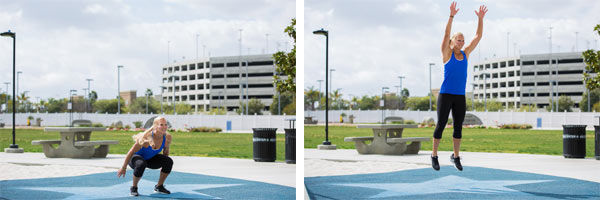
Squat exercises mimic real-life movements and target the entire lower body, including the glutes, quadriceps and hamstrings. Squats also aid in joint flexibility through the hips, knees and ankle joints. A staple exercise in any strength-training program, squats can be performed anywhere and with no equipment necessary.
The squat jump takes the basic squat to the next level by adding explosive power. Use this exercise for a quick cardio pick me up, to increase your vertical jump, and to improve your daily and overall functionality.
How to: Squat Jump
Stand with your feet shoulder-width apart, arms hanging by your sides. Squat down until your knees are bent to 90 degrees; swing the arms behind you. Immediately swing your arms overhead and jump up as high as you can. Land softly back into the squat and immediately perform another jump. Perform two to three sets of 10 jumps.
Swap #2: Push-ups for Burpees
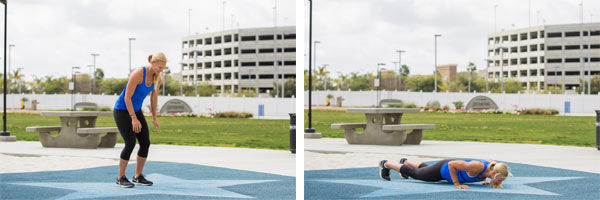
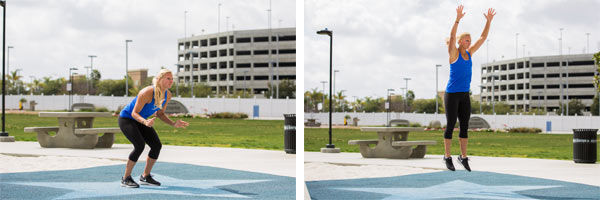
Whether you love them or hate them, there is no question that push-ups work, targeting the entire upper body, core, and even your glutes and quadriceps.
Swap out the push-up for a burpee and now you are talking about a serious return on your exercise investment. It also provides an ego boos, unrivaled by any other exercise.
How to: Burpee
Squat down and place your hands on the floor in front of you. Jump or walk both feet back to a high-plank position. Perform one push-up. Jump or walk both feet back in toward the hands. Jump up, reaching your arms overhead. Perform one to two sets of 10.
Swap #3: Lunges for Lunge Mountain Climbers
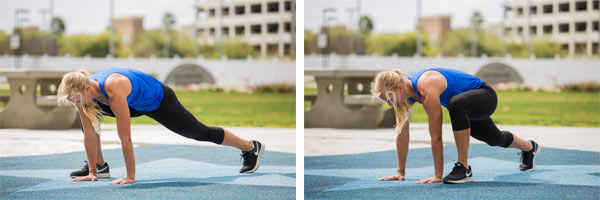
The lunge is a multi-joint exercise, like the squat, that strengthens the glutes, quadriceps and hamstrings. Due to the split-stance set up, lunges also help to strengthen your core and improve hip flexibility, which can enhance your balance and help prevent lower-back pain.
The lunge mountain climber, a hybrid exercise of forward lunges and mountain climbers, is a swap that challenges the legs to jump, the core to engage and assist in holding the plank position, and the hip flexors to stretch.
How to: Lunge Mountain Climber
Begin in high-plank position. Bend your right knee and bring your right foot forward, placing your right foot to the outside of your right hand. Push off of both legs and switch the legs so that your left foot lands to the outside of your left hand. Perform two sets of 10 lunge switches. Right and left lunges = 1 rep.
Swap #4: Jumping Jacks for Rotational Jacks
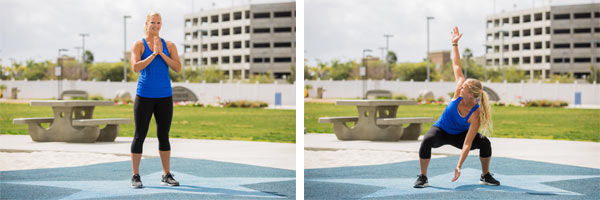
The jumping jack is one of the best ways to activate every muscle in your body. Used as a warm-up, cardio exercise or HIIT drill, this exercise is performed everywhere from the gym to the playground.
Rotational jacks breathe new life into the classic jumping jack by adding a twist—literally. Rotating at the torso and jumping out to the squat position adds intensity, but also make this exercise even more fun to do.
How to: Rotational Jacks
Stand with your feet together and hands together at your chest. Jump up and land in a squat position with your feet wider than shoulder-width and the toes turned slightly outward. As you land in the squat, rotate from the waist and reach your right hand down toward the floor and reach your left hand up toward the ceiling. Jump back to the starting position and immediately repeat the jump squat, reaching your left hand down toward the floor and your right hand up toward the ceiling. Perform two sets of 10. Right hand down, then left hand down = 1 rep
Swap #5: Russian Twist for Side Elbow Plank With a Twist
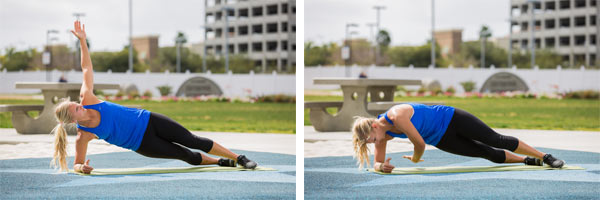
The Russian twist, which combines isometric and dynamic movement, is an excellent exercise to strengthen your obliques and back muscles that support the spine.
The side elbow plank with a twist also incorporates elements of both isometric and dynamic work, challenging the muscles of the side body to stay balanced and lifted off the floor, thereby intensifying the work of the obliques.
How to: Side Elbow Plank With a Twist
Lie on your right side with your legs in one of three positions:
-Right knee bent; left leg straight
-Both legs straight, scissoring the legs with the left leg on the front and right leg on the back
-Both legs straight and stacked, left leg on top of the right
Prop your upper body up on your right elbow and forearm and raise your hips off the floor until your body forms a straight line from your head to your feet. Reach your left arm up toward the ceiling. Rotate your torso downward and reach under your body with your left arm. Perform two sets of 10 on each side, alternating right and left.
Swap #6: Calf Raises for Jumping Rope
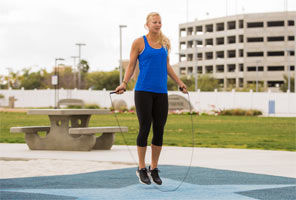
Whether you want to jump higher or just perform everyday activities like walking and climbing stairs with greater ease, calf raises are an essential exercise for strengthening the muscles in the lower leg.
Jumping rope is an intense swap for calf raises, but it’s definitely worth the extra effort. Jump rope helps to improve foot speed, agility and quickness so you can move in multiple directions with ease.
How to: Jumping Rope
Choose a rope that, when folded in half, reaches up to your shoulders. Hold the rope’s handles in each of your hands and extend your forearms at least a foot away from your body. You need this space to create an arc for you to jump through. Keeping your arms still, use your hands and wrists to swing the rope over your head. Jump over the rope, pushing off with the balls of your feet and keeping the motion in your ankles instead of your knees. Perform three sets of jumping rope for 30 to 60 seconds.




 by
by 






 by
by